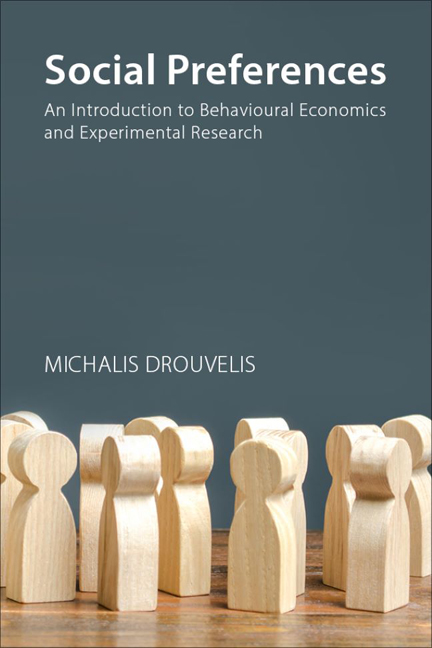Book contents
- Frontmatter
- Contents
- Preface
- 1 Introduction
- 2 Bargaining games
- 3 Trust and gift exchange games
- 4 Public Good Games I
- 5 Public Good Games II
- 6 Leadership
- 7 Public good games with sanctioning I
- 8 Public good games with sanctioning II
- 9 Cross-cultural experiments
- Appendix A Experimental instructions
- Appendix B Practical information
- Notes
- References
- Index
Preface
Published online by Cambridge University Press: 22 December 2023
- Frontmatter
- Contents
- Preface
- 1 Introduction
- 2 Bargaining games
- 3 Trust and gift exchange games
- 4 Public Good Games I
- 5 Public Good Games II
- 6 Leadership
- 7 Public good games with sanctioning I
- 8 Public good games with sanctioning II
- 9 Cross-cultural experiments
- Appendix A Experimental instructions
- Appendix B Practical information
- Notes
- References
- Index
Summary
The present book offers an introduction in the experimental economics literature pertaining to aspects of individuals’ social preferences. In its nine chapters and two appendices, this book discusses some key experimental economics paradigms that behavioural scientists are frequently using in order to gain a better understanding of human behaviour. These paradigms consist of bargaining games, trust games, simultaneous public good games without and with punishment, and sequential public good games. The extant literature has produced a huge literature and has considerably advanced our knowledge. The aim of this book is not to present a comprehensive literature review of the existing social preferences experiments. Instead, we offer an accessible discussion of a selective part of the literature that can be used for a semester-long course in behavioural and experimental economics, with a focus on social preferences. The book is targeted at those who have little background in the field of experimental economics and the choice of the topics discussed reflects a bias towards my own research interests. However, it is hoped that the offered discussion presents a series of novel and influential experiments in the literature.
It is also important to underscore that the length of each chapter has been selected with the main principle being that the material presented should be no more than 20 pages, which seems to be a sensible length for students’ weekly workload. In parallel, it was aimed that for some important papers, the key aspects of the experimental design, hypotheses and results are presented. The primary objective was to make the content of the book friendly to students, keeping the language as simple as possible (unlike academic papers which may use more technical terms sometimes) and helping them absorb the key elements more easily. At the same time, some experiments which are discussed in less detail aim to give students a general idea of the corresponding literature. Providing all this level of detail (at least) for some of the papers comes at a cost of limiting the number of papers that can be discussed in a given chapter but on the other hand, this structure hopefully gives a clearer description of the key papers, compared to other behavioural economics textbooks which only focus on a brief discussion of the main findings of papers.
- Type
- Chapter
- Information
- Social PreferencesAn Introduction to Behavioural Economics and Experimental Research, pp. vii - viiiPublisher: Agenda PublishingPrint publication year: 2021

